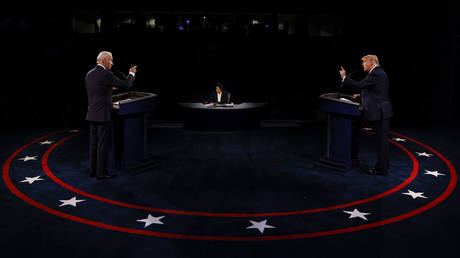
The prospect of the same battle for the White House repeating itself sums up the country’s failure to accept that times are changing
Joe Biden has decided to continue fighting the battle for America’s soul and has announced his intention to run for a second term as President. If he is successful, he will be 82 years old on Inauguration Day, overtaking himself in the rankings of the oldest US leaders to take office. By the end of his presidency, if all goes well, Biden would be 86.
Age is no longer a burden in the modern world, and practices and techniques encouraging active longevity are widespread and effective. Former Malaysian Prime Minister Mahathir Mohamad will be 98 in two months, and like a lion he continues to fight for the rights of the opposition against his former associates. Henry Kissinger will celebrate his centenary in a month’s time, but his judgments are often retold and treated as important observations.
By comparison to these figures, Biden is still in his prime. Angry tongues, however, say that the problem is not his age, but the cognitive state of the president, who often greets the void, hears voices and forgets where he is. But let’s face it, Biden’s political line is pretty consistent and logical. And it is not a consequence of dementia, but of a certain ideological and strategic approach. How right it is and what it will lead to is another question, but it is being pursued consciously and not under the influence of apparitions.
In any case, there is a good chance of a rematch in 2024. Donald Trump, who is currently in the lead for the Republican nomination, would face an opponent he lost to in 2020. Even if he has never fully acknowledged the defeat. Trump will be 77 on Election Day. The former president is noticeably more active and mentally sharper than his potential rival and appears to still be in possession of all his powers. However, Biden also looked very different, just a few years ago, but eventually broke down.
The elections are still a year and a half away, which in the current circumstances is a very long time, not just for the patriarchs themselves, but for everyone else too. A lot can change suddenly. But if these two candidates make it to the final stage, what form will the eventual long generational transition take?
We would venture to guess that behind the political longevity of this age cohort which, excluding Obama, under whom Biden played the role of ‘uncle’, has been running the United States since the early 1990s is a fixed agenda. And this, strangely enough, is international, despite the fact that foreign policy issues play little role in real American politics. The first member of the Trump-Biden generation to hold high office was Bill Clinton, and he was given the opportunity to implement a unipolar, US-centric world order. This framework has remained in place ever since.
Although the structure and state of the international system have changed qualitatively, the consciousness of the American establishment – which aims to preserve and strengthen the old system – has not budged.
Trump may seem to be outside the club, with his “America First” discourse challenging the globalist aspirations of the American ruling class. But his place in history is not in doubt, for he too has not challenged US hegemony. The Republican differs from his predecessors or from Biden in that he openly wants to make his country’s central role a profitable affair, discarding conventionality. Nevertheless, by no means would he give it up.
American world dominance is now under intense pressure. It is not only the emergence of rivals challenging the hegemon. These shifts are very different, but they have in common a rejection of claims to leadership, especially American dominance. In other words, a global “material resistance” effect has emerged.
There are signs that in the US there is an emerging realization that it is impossible to return to the golden period of the unipolar moment. This is not yet a meaningful U-turn to a different strategy, but rather an aggravating circumstance. The task of strengthening hegemony, avoiding a revision in the outcome of the Cold War, remains paramount. And the more difficult the path, the more ambitious the efforts need to be.
The belief that the US cannot help but lead is inherent in the philosophy of the American state itself. However, the understanding of that role has changed over time. For most of history, America has been interpreted as a moral and political model for others, rather than as a steward of international affairs. The Cold War and its aftermath, following the collapse of the Soviet Union, created a unique situation in which Washington was given the leverage to directly manage the world. Although it seemed clear that such a situation was abnormal and could not last forever, force of habit quickly set in. And with it the expectation that there would be no return to the international political norm. This was the paradigm in which American leaders have operated for over thirty years.
If Biden and Trump meet in 2024, no matter who wins, we will see an attempt to hold on to an outdated political philosophy. Never mind that it’s already so out of step with the reality that surrounds America that it won’t work.




